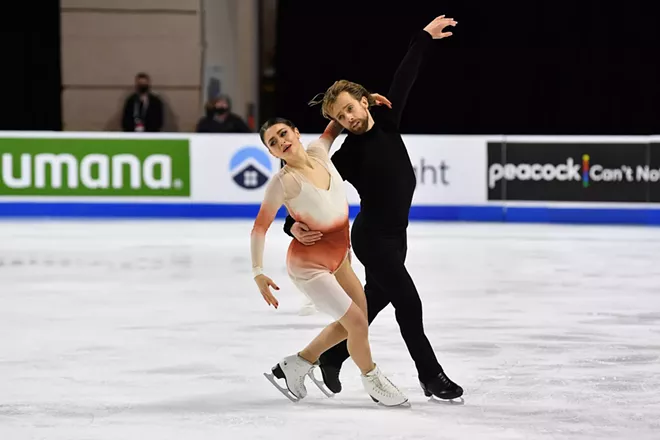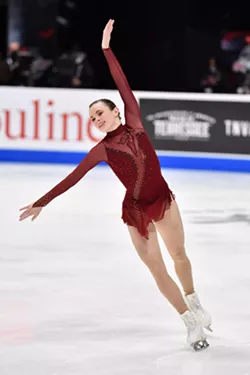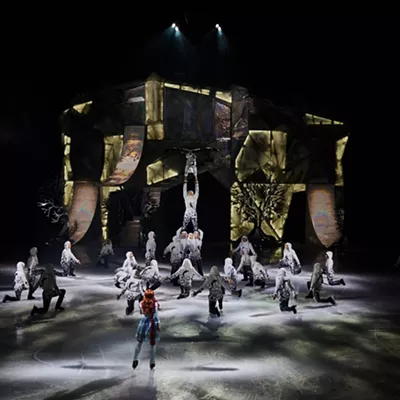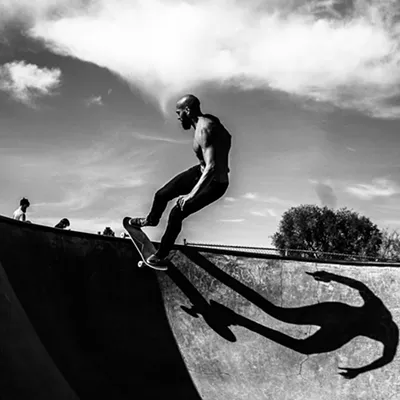
Quadruple jumps. Dazzling spins. Perfect synchronization. One skater flinging another through the air, who manages to land gracefully on a thin blade moving across a sheet of ice. Most can only imagine the difficulty of elite figure skating: launching in the air to spin three or four full revolutions before gravity pulls you down, then landing on one leg. Now picture doing it at full speed amid a packed routine of spins, leaps and choreographed dance set to music.
Ice dancer Kaitlin Hawayek says the combination of elite athleticism and performance art is what makes figure skating unique.
"It's why people are so intrigued by the sport," she says. "It's not just an adrenaline rush; skaters also connect with the audience on a core emotional level."
Hawayek, along with ice-dancing partner Jean-Luc Baker, will perform in Spokane Friday, May 27, as part of Stars on Ice, alongside skating luminaries who include fellow Olympians Nathan Chen, Mariah Bell and Jason Brown. The event is a "showcase of the top skaters in the U.S.," Bell explains, where skaters perform routines from the Olympics alongside new ones. It's an opportunity for skaters to let loose and be more playful than regular competition allows, and a chance for audiences to see Olympians up close and in person.
For Jean-Luc Baker, who hails from Edmonds, the stops in Spokane and Seattle are a homecoming of sorts. He's one of a select few Washingtonians ever to reach the Olympic level in figure skating.
"It's such an honor," Baker says. "And Stars on Ice is one reason why I am where I am today," he adds, explaining that as a child skater he had the opportunity to perform in one of the tour's stops in Seattle. "That was huge for my trajectory."
THE JOURNEY
Competing in Beijing was Jason Brown's second time as an Olympian, after winning a bronze medal in the team event in Sochi. But after the 2014 Olympics, he struggled with imposter syndrome, fearing he didn't truly deserve the title of Olympian unless he could make it back a second time. "I lost a lot of the joy of skating because I was so hyperfocused on that," Brown says. "I constantly felt like I wasn't doing well enough."
In 2018, Brown was first alternate for the U.S. team for the PyeongChang Winter Games in South Korea, just missing a guaranteed spot. "There was a piece of me that kind of broke," he says. "I felt irrelevant... I got lost in that mental place of thinking about everything I lacked." Amid an explosion of quad jumps in the sport (an element he has landed in competition but not as often), he worried whether his type of skating — a balance between precision, athleticism and performance — was being devalued. Eventually, he was able to work through the self-doubt.
"I so respected everybody who was pushing the boundaries technically, and finally I thought, 'Why don't I respect myself for pushing it forward artistically?' I just started to do that. Did I still come into the rink every single day to work on my technical difficulty? Absolutely. But I wasn't harping on myself the way I was in the past. Soon I could feel myself maturing, feel my skating getting stronger and better, and that kept my fire going."
Brown, who notes he has seen a sports psychologist since he was 10, is a firm believer in the importance of mental health. "I cannot express enough how important it is for people to be open about it," he says. His teammates echo the sentiment, acknowledging the intense isolation of training and competing during the pandemic.

Hawayek appreciates that mental health is becoming less taboo to talk about. Bell also feels glad for the conversation. "It seems like for a while it wasn't really spoken about, but then people like Simone Biles led the way," Bell says. "It's so inspiring that she came forward and talked about her experience in Tokyo. It was brave. When people like her do that, it helps others do it as well."
"So often in sports, we're focused on what we need to get done to perform at our best, but when the pandemic hit, there was a real time of vulnerability where people realized those around them were having the same feelings and experiences," Brown says.
"It's something that everybody deals with in some way or another, and athletes are no different," Bell adds. "Whatever you might be feeling or struggling with, you're not alone."
SNEAK PEEK
"What's unique about Stars is that we have group numbers, so you'll see us all perform together, which you would never see in a competition," Bell explains. The playful atmosphere also lends itself to skaters doing tricks they wouldn't do in competition, such as Nathan Chen busting out backflips.
Brown is set to perform two solo skates, the first being his wildly successful short program, set to Nina Simone's "Sinnerman" and choreographed by Rohene Ward.
"To be honest it's been a dream come true getting to perform that on tour, because it was really designed to be performed in front of a crowd," Brown says. "Every time I'm in starting pose I'm bubbling over with excitement."
Baker says he and Hawayek have missed being able to interact with fans. "We see you and we hear you, always," Baker says. "We feel your energy, and we love it. Be loud! The louder you are, the more energy we'll reciprocate." ♦
Stars on Ice • Fri, May 27 at 7:30 pm • $32-$142 • Spokane Arena • 720 W. Mallon Ave. • spokanearena.com • 509-279-7000
SINCE THE OLYMPICS
Nathan Chen and Mariah Bell were recently honored with awards from the Professional Skaters Association. For the second year in a row, Bell won the Sonja Henie Award, honoring a skater who embodies both excellence and positivity. Henie was a three-time Olympic champion and 10-time world champion skater from Norway.
"Even more important than how I do in skating is the person that I am," Bell says. "I'm really grateful people can see that in me; it means a lot. Hopefully I can be someone the younger girls look up to, or at least be a great teammate for them. I'm so lucky to be in a position where I can do that."


















